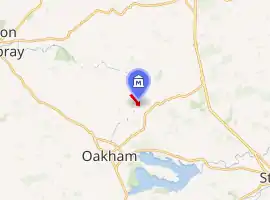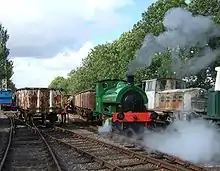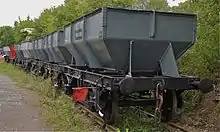Rutland Railway Museum
Rutland Railway Museum, now trading as Rocks by Rail: The Living Ironstone Museum, is a heritage railway on part of a former Midland Railway mineral branch line. It is situated north east of Oakham, in Rutland, England.
.jpg.webp) Andrew Barclay "Sir Thomas Royden" with a train of mineral wagons. | |

| |
| Location | Cottesmore, Oakham, Rutland |
|---|---|
| Type | Railway museum |
| Website | http://www.rutlandrailwaymuseum.org.uk/ |

Overview
The museum offers an open-air site dedicated to recreating an ironstone tramway system in its entirety from the extraction of iron ore from a 'first cut' quarry face reproduced in the quarry viewing area to the exchange sidings with the BR rail head. The museum aims to preserve and operate industrial locomotives and mineral wagons from local quarry railways as well as artefacts related to quarry railways in general.
The museum site is based on a typical 1950s or early 1960s quarry system when both steam and diesel power was evident in the industry. The branch line linked to the Melton Mowbray to Oakham main line at Ashwell Signal Box. Exchange sidings were once located at the museum serving three separate private quarry railway systems associated with the past extraction of iron ore. The museum site was known locally as Cottesmore Iron Ore Mines Sidings.
The concrete tipping dock built for Cottesmore quarries has been conserved, along with the locomotive running shed from Woolsthorpe Quarries, Lincs in its entirety. Also preserved are several items of quarry machinery including a 22RB Ruston-Bucyrus face shovel, a 22RB Ruston-Bucyrus dragline excavator and a Euliddump truck as used in local quarry systems. The cab of the massive Ransomes & Rapier dragline excavator Sundew is on display.
Also present at the museum is the Simon Layfield Exhibition Centre which comprises three roads of locomotive/wagon exhibits and related displays concerning former local quarry railways.
Also on display at the museum is Hawthorn Leslie locomotive "SINGAPORE" works number 3865 built in 1936. This locomotive was exported to Singapore Royal Navy Dockyard and was captured in February 1942 by the Japanese during World War II. The locomotive features superficial bullet and shrapnel damage sustained during air raids on the dockyard from Japanese aircraft. The locomotive HL3865/36 "SINGAPORE" is an honorary member of the FEPOW organisation.
The museum operates passenger rides on a 0.75 miles (1.21 km) length of track and occupies an area of nearly 9 acres (28,000 m²). Passenger rides are provided in restored brake vans, typical of those formerly used in freight trains in the area. The museum welcomes any related donations of artefacts or information which may help further its aims.
Locomotives
Steam locomotives

- Hawthorn Leslie 0-4-0ST works No. 3865 "SINGAPORE" built in 1936. On display, subject of a fund-raising appeal for an overhaul to working condition. Ex HM Dockyards Singapore, Ex HM Dockyards Chatham
- Andrew Barclay 0-4-0ST works No. 1931 built in 1927. Under repair. Ex British Sugar BSC, Wissington, Norfolk
- Andrew Barclay 0-4-0ST works No. 2088 "SIR THOMAS ROYDEN" built in 1940. Operational following the completion of an overhaul in 2011. Ex CEGB, Stourport
- Andrew Barclay 0-6-0ST outside cylinder works No. 2350 "BELVOIR" built in 1954.[1] Ex Stewarts & Lloyds, Woolsthorpe quarries, Lincs.
- W.G. Bagnall 0-6-0ST outside cylinder works No. 2668 "CRANFORD No. 2" built in 1942. On display. Ex Staveley Minerals, Cranford, Northamptonshire.
- Peckett & Sons 0-4-0ST works No. 1257 "UPPINGHAM" built in 1912. On display awaiting restoration. Ex James Pain ironstone quarries (numerous), later moved to Tarmac Roadstone, Wirksworth, Derbyshire.
- Peckett & Sons 0-4-0ST works No. 1759 "ELIZABETH" built in 1928. Undergoing overhaul. Ex Redland Roadstone, Mountsorrel, Leics.
- Hunslet Engine Company 0-4-0ST works No. 287 "VIGILANT" built in 1882. Undergoing restoration. Ex Corby Iron Ore Co.
- Avonside 0-6-0ST works No. 1972 "STAMFORD" built in 1927. On display awaiting restoration. Ex Stewarts & Lloyds, Pilton quarries, Rutland
- Hudswell Clarke 0-6-0ST No. 1308 "RHOS" built in 1918. Dismantled, awaiting restoration. Ex Stewarts & Lloyds Corby quarries
- Yorkshire Engine Company 0-6-0ST No. 2521 built in 1952. On display. Ex Appleby Frodingham "Ore Mining Branch" Scunthorpe
Diesel locomotives
.jpg.webp)

- Yorkshire Engine Company Janus class 0-6-0DE works No. 2791 "DE5" built in 1962. On display. Ex Exton Park Ironstone Quarries, Rutland & BSC, Scunthorpe.[2]
- Yorkshire Engine Company 0-6-0DE works No. 2872 1382 built in 1962. Operational. Ex Colsterworth Quarries and Easton Mines.
- Rolls Royce Ltd 0-4-0DH works No. 10201 "BETTY" built in 1964. Operational. Ex Oxfordshire Ironstone, Banbury, Derwenthaugh Coking Plant & Stewarts & Lloyds, Harlaxton, Lincs.
- Rolls Royce Ltd 0-4-0DH works No. 10204 "JEAN" built in 1965. Operational. Ex Oxfordshire Ironstone, Banbury, Glendon Quarries, Northamptonshire, Bibby Construction, London Carriers & ELR, Bury.
- Rolls Royce Ltd 0-4-0DH works No. 10207 "GRAHAM" built in 1965. Undergoing restoration. Ex Oxfordshire Ironstone Co. & Stanton and Staveley Ilkeston, Derbyshire
- John Fowler & Co. 0-4-0DH works No. 4220007 "KETTON No. 1" built in 1960. Undergoing restoration. Registered 2990/1960 Transport Commission. Ex Ketton Cement Works.
- Ruston Class 165DE 0-4-0DH works No. 421436 "ELIZABETH" built in 1958. On display. Ex Rugby Cement, Barrington.
- Thomas Hill 4wDH works no. 186V "Mr D" built in 1967. Undergoing overhaul. Ex Rugby Cement, Barrington.
- Thomas Hill 4wDH works no. 178V No. 8 built in 1967. On display. Ex Rugby Cement, Barrington.
- Ruston Class 48DS 4wDM works No. 207103 built in 1941. Undergoing overhaul. Ex British Benzol at Bedwas Coke Ovens.
- Ruston Class 88DS 4wDM works No. 306092 built in 1950. On display. Ex British Electricity Authority Bidder Street Power station, Canning Town, London.
- Ruston Class LPSE 0-4-0DE works No. 544997 "ERIC TONKS" built in 1969. Operational. Ex Hays Chemicals, Sandbach, Cheshire.
Wagons
The museum has a selection of typical quarry wagons which are used for demonstrations on open days. Details are below. The list is not exhaustive.
.jpg.webp)
- Iron Ore Tippler rake
Numerous wagons from this list are available for use and can be seen in operation.
- British Steel Corporation Iron Ore Tippler Wagon 25197. Purchased from BR by British Steel Corporation.
- BR Iron Ore Tippler Wagon B383560. Built in 1954.
- BR Iron Ore Tippler Wagon B384428. Built in 1955.
- BR Iron Ore Tippler Wagon B384768. Built in 1955.
- BR Iron Ore Tippler Wagon B385005. Built in 1955.
- BR Iron Ore Tippler Wagon B385997. Built in 1958.
- BR Iron Ore Tippler Wagon B387245. Built in 1960.
- BR Iron Ore Tippler Wagon B387643. Built in 1960.
- BR Iron Ore Tippler Wagon B388815. Built in 1961.
- Hopper Wagon rake

Numerous wagons from this list are available for use and can be seen in operation.
- LMS Iron Ore Hopper Wagon M690379. Built in 1935.
- LMS Iron Ore Hopper Wagon M691079. Built in 1938.
- LMS Iron Ore Hopper Wagon M691193. Built in 1938.
- LMS Iron Ore Hopper Wagon M691404. Built in 1938.
- LMS Iron Ore Hopper Wagon M691535. Built in 1938.
- LMS Iron Ore Hopper Wagon M691576. Built in 1938.
- LMS Iron Ore Hopper Wagon M691793. Built in 1939.
- LMS Iron Ore Hopper Wagon M691804. Built in 1936.
- BR Iron Ore Hopper Wagon B436275. Built in 1950.
- Appleby-Frodingham 21 ton peak-ended Iron Ore Hopper Wagon P210000. Built by Central Wagon, 1938.
- Sheepbridge Iron and Steel Co. Hopper Wagon 101011. Built by Charles Roberts, 1926.
- Private Owner Steel Mineral Hopper Wagon P15675. Built 1915 for Liverpool Corporation Electricity Supply by Cammell Laird, Nottingham. Ex British Sugar.
- Richard Thomas CO. Steel Hopper Wagon P64965. Built in 1910.
- Brake Vans
The brake vans are used both in the passenger and goods trains.
- LMS 12 ft Goods Brake Van M286341. Built in 1926.
- LMS 16 ft Goods Brake Van 731874. Built in 1944.
- WD 16 ft Brake Van 49006. Built in 1941.
- BR Shark Ballast Plough Brake Van DB993734. Built in 1953.
References
- "Steam loco comes home after 30 years" Melton Times 24 October 2008
- "YE 2791 – DE5 | Rocks by Rail". Rocks by Rail. Retrieved 9 June 2019.
External links
| Wikimedia Commons has media related to Rutland Railway Museum. |